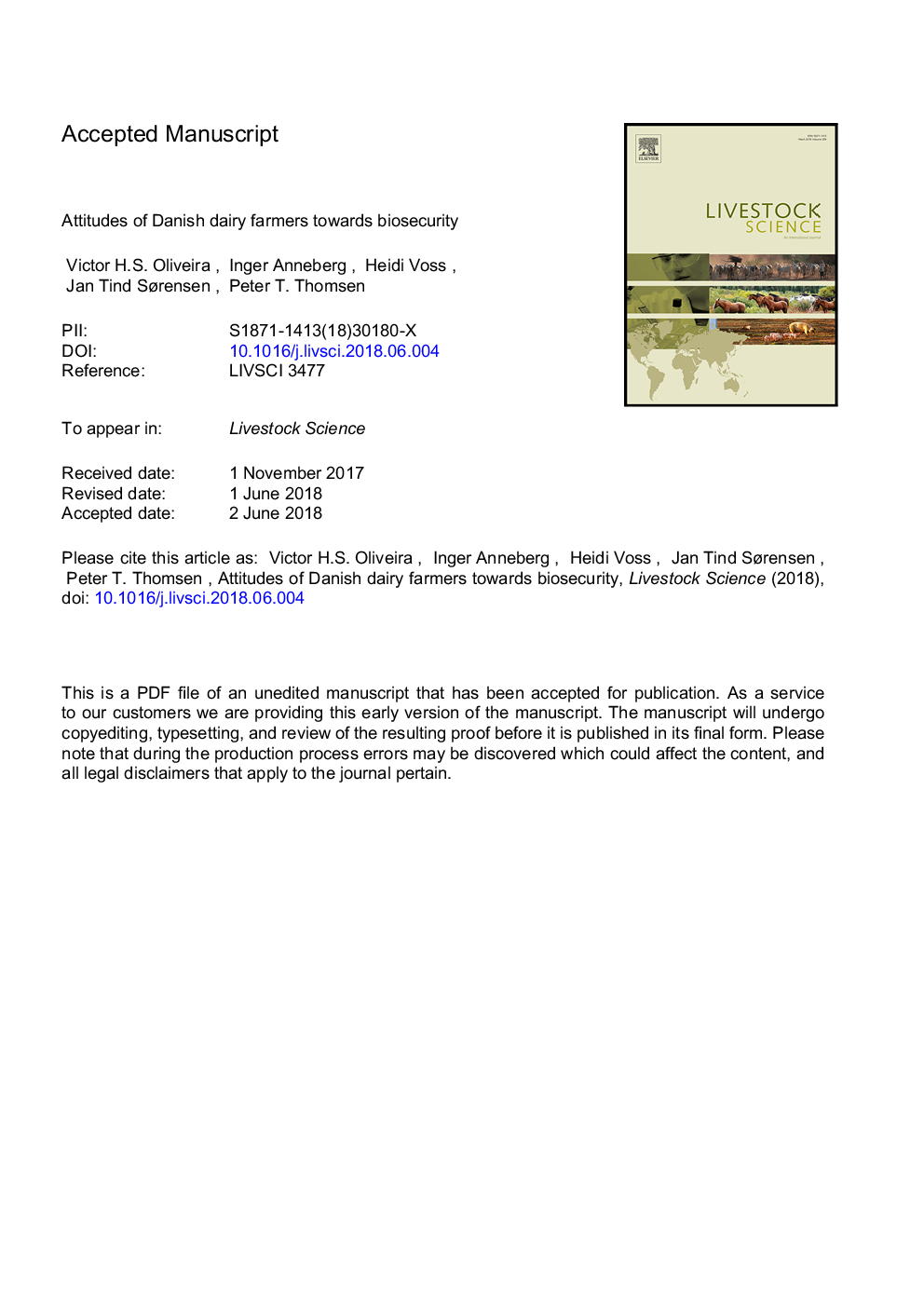| کد مقاله | کد نشریه | سال انتشار | مقاله انگلیسی | نسخه تمام متن |
|---|---|---|---|---|
| 8501913 | 1553918 | 2018 | 40 صفحه PDF | دانلود رایگان |
عنوان انگلیسی مقاله ISI
Attitudes of Danish dairy farmers towards biosecurity
ترجمه فارسی عنوان
نگرش کشاورزان دانمارکی نسبت به امنیت غذایی
دانلود مقاله + سفارش ترجمه
دانلود مقاله ISI انگلیسی
رایگان برای ایرانیان
کلمات کلیدی
نگرش کشاورز، مصاحبه کیفی سلامت گاو شیری، پیشگیری از بیماری، بهداشت ایمنی، تمرین مدیریت،
ترجمه چکیده
سناریوی تصدیق بیولوژیکی کافی در گله های شیری نشان داده شده است. این ممکن است به سلامت حیوانات و انسانها خطور کند، به علاوه افزایش نگرانی در مورد بهره وری و رفاه حیوانات به خطر افتاده است. اهداف مطالعه ما بررسی درک کشاورزان لبنی دانمارک در مورد امنیت بیولوژیک و عوامل ایجاد انگیزه و محدود کردن پذیرش اقدامات بیولوژیکی است. شانزده کشاورز با استفاده از مصاحبه های نیمه ساختاری گسترده برای مصاحبه با چهره به چهره برای بررسی ادراکات و نگرش آنها نسبت به امنیت غذایی مصاحبه کردند. کشاورزان متداول و ارگانیک از مناطق مختلف دانمارک که مورد نیاز یا ناقض قوانین خاصی برای امنیت غذایی بودند، در این مطالعه شرکت کردند. تجزیه و تحلیل موضوعی مصاحبه ها بر اساس پدیده هایی که توسط کشاورزان بیان شده بود انجام شد. شیوه های بیولوژیکی شناخته شده برای جلوگیری از معرفی و گسترش بیماری های عفونی در گله ها به طور گسترده توسط کشاورزان مورد بحث قرار گرفته است، به عنوان مثال نگهداری یک وضعیت گله بسته و روال برای اطمینان از بهبود بهداشت هنگام حمل حیوانات و در امکانات. با این حال، ما شناسایی کردیم که کشاورزان بیان نگرش های بهداشتی آرام را تحت شرایطی مانند موقعیت گله در یک منطقه که ظاهرا کمتر از بیماری تهدید می شوند، نیاز به افزایش اندازه گله و ارزش های مربوط به حفظ سیستم کشاورزی بدون محدودیت های بیش از حد شناسایی کرد. سایر محدودیت های بالقوه برای تصویب صحت بیولوژیکی شامل ارتباط دشواری میان کشاورزان و کارمندان و بازدید کنندگان آنها، عدم آگاهی در مورد مسیرهای آلودگی و محدودیت های مالی بود. کشاورزان از منابع مختلف اطلاعاتی در مورد امنیت بیولوژیک دریافت کردند، دامپزشکان اصلی ترین و مورد اعتماد قرار گرفتند. هنگامی که کشاورزان توصیف اقدامات بیولوژیکی را اتخاذ کردند، بر مبارزه با بیماری های مهم محلی، که به صورت اندمیک، بخشی از برنامه های کنترل دولتی بود، تاکید می کردند، و شیوع بیماری های اخیر، یعنی درماتیت دیجیتال، سالمونلوز و مایکوپلاسموز را در بر داشت. بر خلاف گزارش قبلی، تمام کشاورزان که بایستی یک طرح بیولوژیکی را با توجه به قوانین خاصی تهیه کرده بودند اعلام کردند که آنها آن را داشته اند. دیدگاه های مفیدی در مورد این قانون به عنوان راهی برای تضمین پذیرش دوجانبه ایمنی در بین کشاورزان بود، در حالی که برخی دیگر معتقد بودند که ممکن است قوانین مورد نیاز نباشد. یافته های این مطالعه نشان داد که به طور کلی جنبه های مهم بهداشت زیستی کشاورزان به رسمیت شناخته شده است. علیرغم این، عوامل محدود کننده پذیری اقدامات ایمنی زیستی وجود داشت.
موضوعات مرتبط
علوم زیستی و بیوفناوری
علوم کشاورزی و بیولوژیک
علوم دامی و جانورشناسی
چکیده انگلیسی
A scenario of insufficient biosecurity adoption in dairy herds has been pointed out. This may pose risks to animal and human health, besides raising concerns about compromised productivity and animal welfare. The objectives of our study were to explore the understanding of Danish dairy farmers regarding biosecurity and factors motivating and limiting their adoption of biosecurity measures. Sixteen farmers were face-to-face interviewed through extensive semi-structured interviews to investigate their perceptions and attitudes towards biosecurity. Conventional and organic dairy farmers from different regions in Denmark, who were required or not required to comply with a specific biosecurity legislation, took part in the study. A thematic analysis of the interviews based on phenomena expressed by the farmers was performed. Recognized biosecurity practices to prevent introduction and spread of infectious diseases in the herds were broadly discussed by farmers, e.g. maintenance of a closed herd status and routines to ensure improved hygiene when handling animals and in the facilities. However, we identified farmers expressing relaxed biosecurity attitudes under situations such as the herd's location in a region supposedly less threatened by diseases, need for increased herd size, and values related to keep a farming system without excessive restrictions. Other potential constraints for correct biosecurity adoption included difficult communication between farmers and their employees and visitors, lack of knowledge regarding infection routes, and financial limitations. The farmers received information about biosecurity from several sources, veterinarians being considered the main and trusted one. When farmers described adopted biosecurity measures, they emphasized combating locally important diseases that were endemic, part of government control programs, and had recent outbreaks, i.e. mastitis, digital dermatitis, salmonellosis and mycoplasmosis. Contrary to a previous report, all the farmers who were required to develop a biosecurity plan according to the specific legislation stated that they had it. Beneficial views on the legislation appeared as a way to guarantee mutual adoption of biosecurity among farmers, whereas others believed that legislation might not be needed. Findings of this study showed that, in general, important biosecurity aspects were recognized by the farmers. Despite of this, factors limiting the adoption of biosecurity measures were present.
ناشر
Database: Elsevier - ScienceDirect (ساینس دایرکت)
Journal: Livestock Science - Volume 214, August 2018, Pages 153-160
Journal: Livestock Science - Volume 214, August 2018, Pages 153-160
نویسندگان
Victor H.S. Oliveira, Inger Anneberg, Heidi Voss, Jan Tind Sørensen, Peter T. Thomsen,
